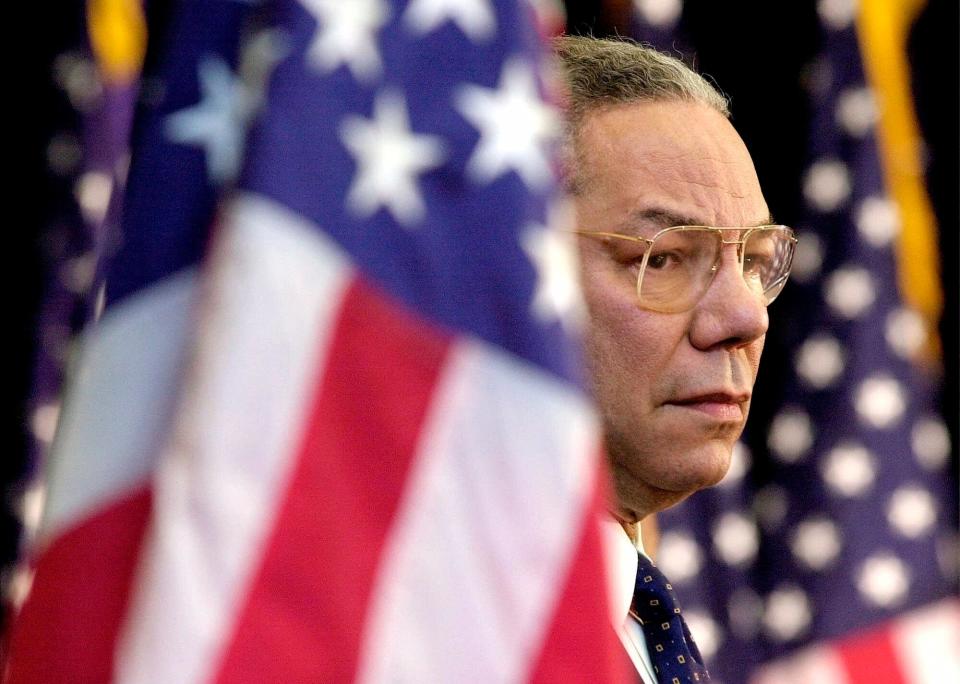What Colin Powell's legacy meant for me as a Black Republican and public servant
- Oops!Something went wrong.Please try again later.
- Oops!Something went wrong.Please try again later.
- Oops!Something went wrong.Please try again later.
- Oops!Something went wrong.Please try again later.
When I was a boy, I remember President Ronald Reagan elevating Colin Powell to be his national security adviser and President George H.W. Bush selecting him to be the 12th chairman of the Joint Chiefs of Staff.
What struck me then as now is that two Republicans had chosen a Black man to serve in the highest levels of the United States government. I wanted to know why this remarkable gentleman had chosen to join the Republican Party. Growing up in Northern California, I didn’t have a friend or family member who was a member of the GOP but there was Powell, a proud member of the party, doing amazing work for all of us.
This struck me deeply and ultimately led me to join the party myself.
Powell, who passed away in October from complications related to COVID-19 at the age of 84, will be honored Friday in a funeral service at the Washington National Cathedral.
Powell: a trailblazer for left and right
I didn’t realize what a trailblazer Powell was until I began working in politics after college graduation. Many Democrats accused me of being a sellout to my race, and many Republicans were skeptical of my bona fides: Was I a plant or a spy for the other party?
What must Powell have endured many decades before I did for publicly aligning himself as a member of the Republican Party?

Years later, I served as a domestic policy adviser to Vice President Dick Cheney and ultimately, President George W. Bush. During my time in the White House, the cramped quarters of the West Wing didn’t have many people who looked like me – but several days a week I would encounter Secretary Powell as I left an early morning meeting heading down the stairs as he was heading to the Oval Office to meet with the president.
USA Today's Austin Bogues: Colin Powell and the what-ifs for the GOP and Black voters
Without fail, Powell would always stop to say hello and ask how I was doing. Many mornings we created a traffic jam on the stairwell, and we would elect to go up or down a flight to continue our conversation. His presence and friendliness always gave me a boost of energy as I began my day.
Why he didn't run?
Early in the Bush administration, I attended a reception where I found Powell and his wife, Alma, in attendance.
I have always wondered why he had never run for the presidency himself, and this event provided me the perfect opportunity to ask him. As we chatted amiably, I said, “General, why didn’t you run for president in 1996 or 2000? I really think you could have won.” Without batting an eye, his wife told me she felt that if her husband had run for the White House, someone could have hurt or killed him because he was a Black man. Looking at me he said, “And that’s why I didn’t run, son.”
I remain as shocked some 20 years later as I did the day I had that conversation with the Powells. Despite his tremendous record in public service at this point in the 21st century, he and his family felt the color of his skin could prove deadly if he sought the presidency.
Assessing a legacy
How then can we assess Powell’s legacy and the trail he has blazed for others to follow? For one, I believe his stature and prominence led America to ultimately elect its first Black president – Barack Obama. Americans were comfortable with Powell’s presence on television, at the Pentagon and in the Oval Office – they would develop a similar confidence with a charismatic young senator from Illinois. It certainly didn’t hurt that Powell would publicly endorse Obama’s run for the White House.
Njeri Mathis Rutledge: Colin Powell and I were once Black Republicans. He taught me to put country over party.
What can the Republican Party along with all Americans learn from Powell’s example as we seek to inspire more people of color to engage in public service?
First, integrity and character matter more than bluster and seeking personal glory to buttress one’s ego. The workhorse always outperforms the show horse. The doors opened by Brown v. Board of Education, the Civil Rights Act of 1964 and the Voting Rights Act of 1965 have allowed Black people the real opportunity to achieve the American dream, and Powell led the way.
For me, Colin Powell opened a door for countless people of color to enter the highest levels of government based on competence while demonstrating that yes, we should be judged based on the content of our character rather than the color of our skin. If only political partisans would heed the example he provided for us all.
Ron Christie is CEO of Christie Strategies LLC, a strategic advocacy firm in Washington, D.C. He is the former special assistant to President George W. Bush and deputy assistant to Vice President Dick Cheney.
You can read diverse opinions from our Board of Contributors and other writers on the Opinion front page, on Twitter @usatodayopinion and in our daily Opinion newsletter. To respond to a column, submit a comment to letters@usatoday.com.
This article originally appeared on USA TODAY: Colin Powell was a trailblazer for Black Republicans

